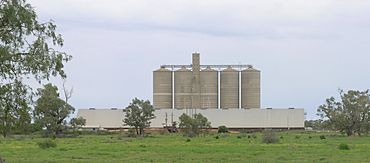Burren Junction facts for kids
Quick facts for kids Burren JunctionNew South Wales |
|
|---|---|

Burren Junction wheat silo
|
|
| Population | 276 (2016 census) |
| Postcode(s) | 2386 |
| Elevation | 163 m (535 ft) |
| Location | |
| LGA(s) |
|
| State electorate(s) | Barwon |
| Federal Division(s) | Parkes |
Burren Junction is a small village in New South Wales, Australia. It is located about 51 kilometers west of Wee Waa. The village sits along the Kamilaroi Highway, which leads to Walgett.
The name "Burren Junction" comes from a local Aboriginal word. This word means "boomerang" or "big creek." The village started growing in 1902. This happened when the north-western rail line was extended. The Burren Junction Post Office officially opened a couple of years later, on May 16, 1904.
Contents
Discover Burren Junction
Burren Junction is part of the Walgett Shire local government area. It is also located in Jamison County. The village is 163 meters above sea level. In 2016, a count showed that 276 people lived there.
What People Do Here
The main jobs in Burren Junction are in farming. Farmers grow crops like wheat and cotton. Some people also raise animals. They breed sheep and beef cattle.
Village Life and Fun Places
Burren Junction has a few important buildings. There are two churches for people to worship. The village also has a cafe where you can grab a bite. You can find a sports ground for games and activities. There is also a local hotel. The RSL and Sporting Club used to be open, but it is now closed.
The Famous Bore Baths
One of the most popular spots is the Burren Junction Bore. This is a special complex with hot mineral water pools. The pools are lit up at night, so you can swim any time. Many tourists and locals love to visit. The Walgett Shire Council takes good care of the baths. They were recently updated and are very clean.
Sports and Recreation
Besides the bore baths, there are other places to have fun. The village has a swimming pool and a park. There are also tennis courts. In the past, Burren Junction held a big annual tennis tournament. People would even use a helicopter to dry the courts after rain! This tournament stopped in the 1980s.
Special Events
For many years, Burren Junction hosted a special event. It was called a Bachelor and Spinster Ball. People would travel from all over Australia to join the fun. It was a night filled with entertainment. This popular event is no longer held.
Amazing Wildlife Sighting!
In 2006, something very exciting happened in Burren Junction. A rare bird was spotted for the first time in Australia. It was a grey-headed lapwing. This bird usually lives in Eurasia. It is a migratory bird, meaning it travels long distances.
Birdwatchers saw the lapwing in a field near the silos. This sighting made a big splash! Many birdwatching visitors came from all over Australia. They wanted to see this special bird while it was in Burren Junction.
Images for kids
 | Dorothy Vaughan |
 | Charles Henry Turner |
 | Hildrus Poindexter |
 | Henry Cecil McBay |




